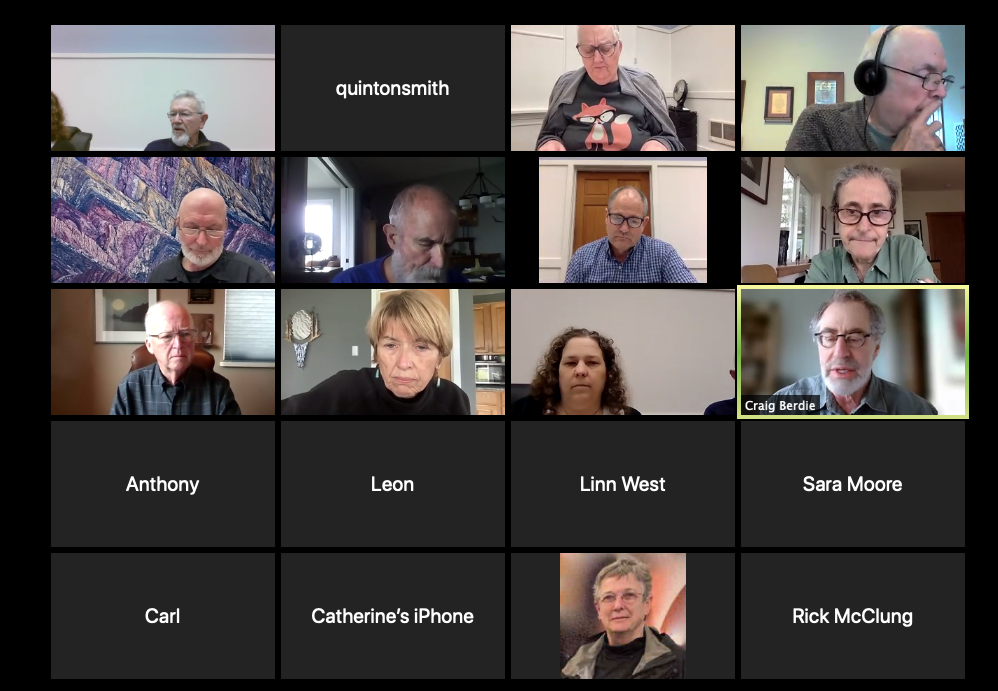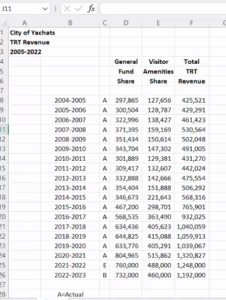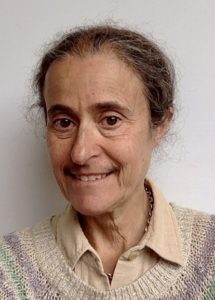
By QUINTON SMITH/YachatsNews.com
YACHATS – Yachats’s new city manager has proposed a $1.74 million general fund budget for 2022-23 that under a staffing reorganization plan pays for adding five employees at city hall and two more in public works.
The proposed budget got its first examination Monday during a four-hour meeting of the city’s budget committee, made up of five appointed citizens and five city council members. The committee examined a few overall categories during the first of two meetings, focusing on hiring and examining the city’s main source of revenue – lodging taxes from motels and vacation rentals. Its next meeting is May 23.
Once the budget committee finishes its work, the spending plan for next fiscal year goes to the city council for a hearing, possible changes and eventual approval before June 30.
The 2021-22 budget was $1.67 million.
It was the first budget for city manager Heide Lambert, who was hired three months ago and walked into an office with one employee and one temporary worker trying to do the work of five or six.
In addition to starting several capital improvement projects, Lambert said the budget focuses on re-staffing city hall and developing a four- to five-year “succession plan” for water and wastewater supervisors.

“Some of you may be alarmed with staffing … but it’s a working document and a learning document,” Lambert said in introducing her budget.
Yachats city hall had been functioning with 1-2 people, including two interim city managers, since March 2021. Matters got worse when deputy city recorder Kimmie Jackson, who best knew city procedures and utility billing, went on leave in December and then served notice that she intended to sue the city for race discrimination, hostile work environment, retaliation and defamation.
Until a spate of recent, temporary hires via a staffing agency, the city had struggled to even answer the phones or keep city hall open, send out bills and collect money, and conduct other routine business.
Lambert said the proposed hires include an office manager, an events coordinator/code enforcement officer, an accounting clerk, a capital projects coordinator, an administrative assistant, and a quarter-time librarian. There are also contracted services for financial support and taking meeting minutes.
Lambert said that planner Katherine Guenther, who also served as interim city manager for 10 months, is currently working full-time during a transition, but would eventually return to working four days a week.
Another complication is that city personnel policies allow Jackson to return to city hall from leave at any time. So the 2022-23 budget had to account for her position and salary – while still spreading her duties among others in city hall during her absence, Lambert said.
After viewing the organization, work and temporary staff the past two months, Lambert said she intended to turn the temporary positions into full-time employees by July 1, after advertising and conducting interviews.
“I wanted to practice this until I was certain” of the staff roles, she told the budget committee.

Lambert also wants to hire two people in public works, the first hires there in years. One would be certified – or get certification over the next few years – in water treatment to eventually replace water lead Rick McClung, who is 4-5 years from retirement. The other would be an entry-level public works employee.
“All of these are service delivery or long-term succession planning,” she said, adding that another goal was to “pull away” from most contracted services and bring those duties into city hall.
“After this year we will keep what’s working and change what’s not,” Lambert said. “My goal is to meet demand for services. I don’t see this slowing down or stopping … but picking up. We’re busy. But it takes administration and staff to do this well.”
Giving the well-known issues with staffing, the budget committee had only a few minor questions about staffing, mostly focused on the public works hiring and how to pay for two new positions. The committee anticipates they can be paid via a projected 5 percent increase in water/sewer rates in fiscal 2022-23 – a separate and later decision by the city council. The 5 percent increase is less than the rate of inflation – currently at 8.3 percent – than what city ordinances could allow.
While the price of water and wastewater treatment supplies is rapidly increasing, the committee was told that water revenue had also increased because the city now has 990 meters, compare with 880 three years ago.
“We’re not going to have these positions in July,” said Lambert, explaining there’s not an immediate impact on the budget from the two public works hires. “It’s going to be hard to fill these positions.”

Lodging taxes
Yachats gets the majority of its operating funds — $760,000 of $1.25 million collected last year — from its 9 percent tax on lodging receipts. The taxes have increased by 25 percent since 2018-19 because the coronavirus pandemic kept travelers closer to home.
But Tom Lauritzen, a budget committee member and longtime city financial adviser who helped Lambert shape the document, said lodging receipts are leveling off to decreasing slightly – but still higher than the pre-Covid year of 2019. For revenue purposes, he estimated the city would collect $1.20 million in 2022-23, but after some discussion the committee lowered that forecast to $1.05 million.
The city has $668,000 in operating reserves and has unanticipated income in getting $80,000 back from a coronavirus business loan program, $174,000 in federal stimulus money and possibly up to $200,000 that Lauritzen believes the city can recoup from the federal government for Covid-19 related expenses this fiscal year.
Computer software
The committee also haggled over a $60,000 line item to continue developing computer software to help merge three systems at city hall, a project the council last year had approved initial steps with a computer consultancy based at Oregon State University. The project has been advocated by councilor Greg Scott, who helped developed a previous computer system used by the city and then mostly replaced three years ago by an “off-the-shelf” system by CivicPlus.
City staff and customers like restaurants, motels and vacation rentals who make payments to the city now use three difference software programs that do not work well together. Lauritzen said that because of software and staffing issues, the city just learned that 21 of 125 authorized vacation rentals had not renewed their licenses for 2022 and that six businesses that collect the city’s 5 percent food and beverage tax had not made payments to the city for six months.

But, Mayor Leslie Vaaler said she had “great discomfort” with spending $60,000 to develop software that she termed “a pet project of a city councilor” and that Lambert was being influenced by “an advocate who is also a city councilor.” Committee member Brad Webb said he also had concern with a council member being involved in the development process.
But Lambert and Scott argued that OSU’s software is intended to simplify processes, improve efficiency and keep better track of bills that are due. Lambert asked the committee to “give us a year” to develop the software and to see if it made a difference.
“I’m asking for some flexibility here,” Lambert said, adding that she was not being influenced by Scott’s involvement in the project. “This system will help our staff be more effective and consistent.”
Vaaler’s motion to cut the $60,000 line item to $30,000 failed 3-7, with committee member John Moore joining Vaaler and Webb in opposition. The overall budget for city materials and services was then approved 8-2 with Vaaler and Webb voting no.
Other items of interest
In addition to the staffing proposals, the proposed budget would:
- Allocate $434,000 to rebuild East Second Street between Prospect and Loma, including waterlines and storm drains. A $100,000 state grant will offset some costs;
- Allocate $110,000 for engineering of a 350-foot boardwalk along Ocean View Drive west of U.S. Highway 101; $20,000 to finish “pocket parks” along Ocean View Drive between Fourth and Sixth streets; and $50,000 for landscape design to create a greenspace out of the field behind city hall;
- Allocate $250,000 for potential water security projects such as purchasing property for water storage tanks adjacent to the treatment plant;
- Allocate $13,000 to hire a part-time librarian;
- Allocate nothing additional for rehabilitation of the Little Log Church Museum, although there is $187,000 in carryover funds from 2021-22 for any work, if the council decides;
- Allocate $230,000 in water projects, ranging from a water-saving backwash system at the treatment plant to upgraded electronics at the treatment plant to a new work truck;
- Change the approach to supporting the visitor center and marketing, which were budgeted for $87,000 total in 2021-22. Lambert’s budget proposes $95,000 total by cutting the city’s contribution to the visitor center from $65,000 to $30,000, increasing the marketing budget from $22,000 to $35,000, and allocating $30,000 for personal or contracted services.


